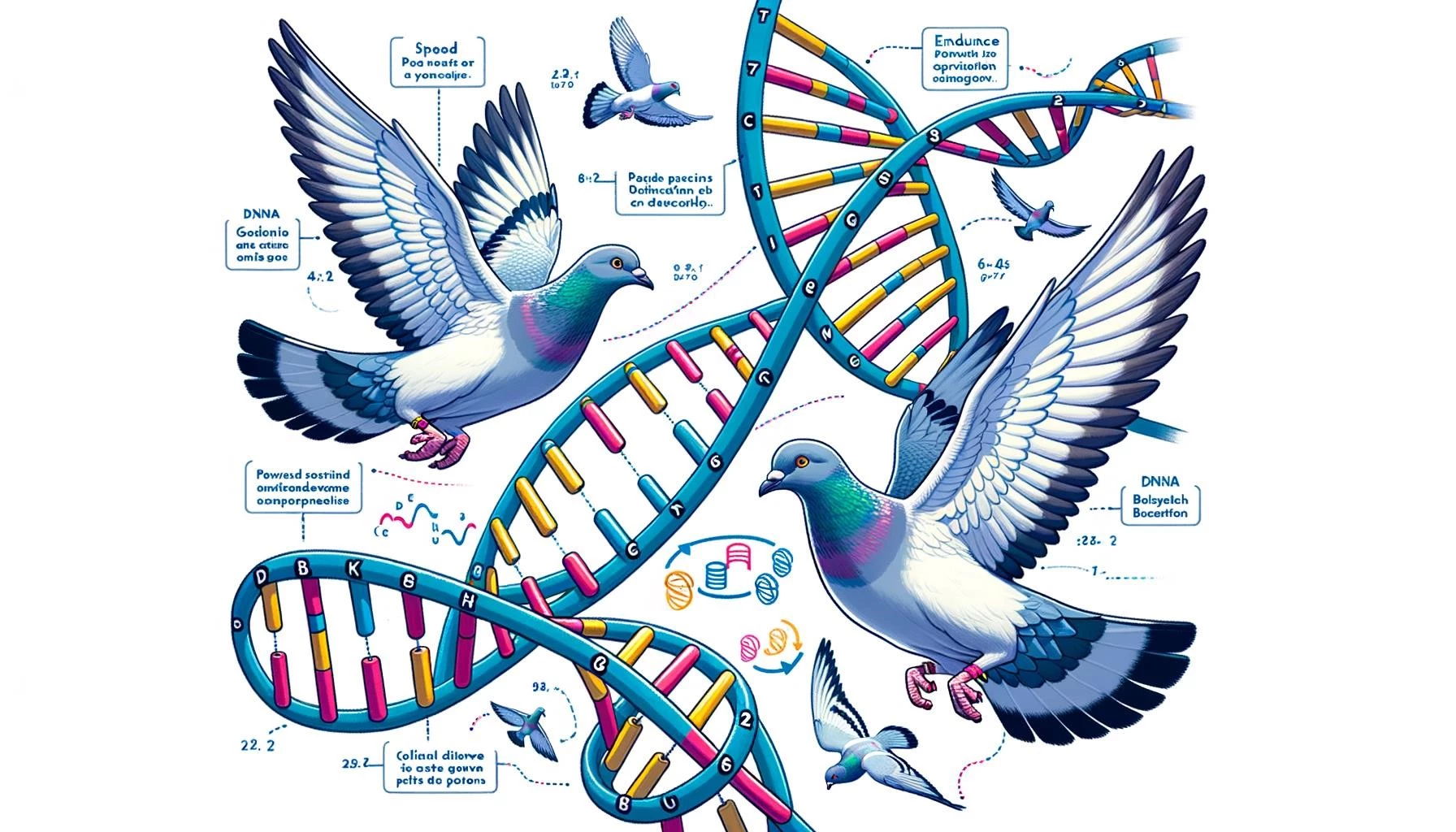Racing pigeons (Columba livia) have been bred and trained for centuries for their extraordinary racing abilities. These birds have become highly prized for their speed, endurance, and navigational skills. The genetics of racing pigeons play a crucial role in determining their performance and success in competitions. By selectively breeding pigeons with desirable traits, breeders aim to produce generations of pigeons that excel in racing. In this article, we will delve into the genetics of racing pigeons, exploring key factors that contribute to their racing capabilities and performance.
Key Takeaways
- Racing pigeons have been selectively bred for centuries to enhance their racing abilities.
- Genetic factors, including genes related to metabolism, muscle development, and feather quality, influence a pigeon’s racing performance.
- Pigeon breeders use genetic testing and analysis to identify desirable traits and make informed breeding decisions.
Genetic Factors Affecting Racing Performance
The racing abilities of pigeons are influenced by several genetic factors. These factors determine the bird’s physiological and physical traits, which play a significant role in their racing performance. Here are some of the key genetic factors that contribute to the success of racing pigeons:
Lactate Dehydrogenase A (LDHA) Gene
The LDHA gene is involved in the production of lactate dehydrogenase, an enzyme critical for energy production during exercise. Variations in the LDHA gene can impact a pigeon’s endurance and stamina. Pigeons with specific variations of the LDHA gene, such as the AA allele, may possess higher levels of energy reserves and demonstrate greater endurance during races.
Dopamine Receptor (DRD) Gene
The DRD gene is associated with the dopamine receptor, a neurotransmitter involved in various physiological functions, including motivation and reward. Genetic variations in the DRD gene can influence a pigeon’s motivation and willingness to race. Pigeons with specific variations in this gene may exhibit higher motivation and stronger competitive instincts.
Myostatin (MSTN) Gene
The MSTN gene regulates muscle growth and development in pigeons. Variations in this gene can affect muscle mass and strength. Pigeons with specific variations that result in decreased myostatin production may have a higher muscle-to-fat ratio, potentially enhancing their flying speed and endurance.
Feather Keratin (F-KER) Gene
The F-KER gene is responsible for the production of keratin, the primary structural protein in feathers. Genetic variations in the F-KER gene can impact feather quality and structure. Pigeons with specific variations may have feathers that are more aerodynamic and resistant to wear and tear, giving them a competitive edge in races.
Genetic Testing and Analysis in Pigeon Breeding
In the world of pigeon racing, genetic testing and analysis play a crucial role in making informed breeding decisions. Breeders use various methods to determine the genetic makeup and potential of their pigeons. Here are some common techniques used for genetic testing and analysis:
mtDNA Testing
mtDNA (mitochondrial DNA) testing is used to trace the maternal line of pigeons and identify specific maternal genetic traits. Many fanciers believe that the maternal line plays a vital role in the race performance of offspring, especially on longer distances. By selectively breeding pigeons from strong maternal lines, breeders aim to pass on the desirable mtDNA traits to subsequent generations.
LDHA Testing
LDHA testing is used to determine the genetic variations of the LDHA gene in pigeons. This testing can help identify pigeons with specific LDHA alleles associated with higher endurance and stamina. By selectively breeding pigeons with desirable LDHA genotypes, breeders aim to improve the racing capabilities of their flock.
Genome-wide Resequencing
Genome-wide resequencing involves sequencing the entire genome of a pigeon. This technique allows researchers to identify genetic variations across the entire genome and pinpoint specific regions associated with desirable traits. By analyzing the genetic diversity and patterns within racing pigeon populations, breeders can gain insights into the genes and genetic markers that contribute to their performance.
Breeding Strategies for Racing Pigeons
Racing pigeon breeders employ various breeding strategies to produce pigeons with exceptional racing capabilities. These strategies involve selecting pigeons with desirable traits and maximizing genetic diversity within the breeding population. Here are some common breeding strategies used in racing pigeon breeding:
Selective Breeding
Selective breeding involves mating pigeons with desirable traits to produce offspring with an increased likelihood of inheriting those traits. Breeders carefully select pigeons with superior racing abilities, such as speed, endurance, and navigational skills, as well as specific genetic variations associated with performance. Through generations of selective breeding, improvements in racing performance can be achieved.
Crossbreeding
Crossbreeding involves mating pigeons from different genetic backgrounds to introduce new genetic diversity into the breeding population. By bringing together pigeons with different racing abilities and genetic traits, breeders aim to create hybrid offspring with improved racing performance. Crossbreeding can help overcome genetic limitations and enhance the overall genetic potential of the racing pigeon population.
Line Breeding
Line breeding involves breeding closely related pigeons, such as siblings or parents and offspring, to perpetuate specific genetic traits. By selectively breeding pigeons from successful racing lines, breeders aim to consolidate and strengthen desirable traits within their breeding population. Line breeding can help maintain and enhance specific genetic characteristics that contribute to racing performance.
Conclusion
The genetics of racing pigeons play a vital role in determining their racing abilities and performance. Genetic factors such as variations in the LDHA, DRD, MSTN, and F-KER genes influence a pigeon’s endurance, motivation, muscle development, and feather quality. Through genetic testing, analysis, and breeding strategies, pigeon breeders aim to produce generations of pigeons with exceptional racing capabilities. By harnessing the power of genetics, breeders strive to enhance the speed, stamina, and navigational skills of racing pigeons, ensuring their continued success in competitive racing.









